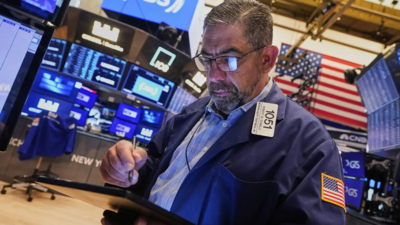ARTICLE AD BOX

US stock markets pushed higher on Friday, with the S&P 500 and Nasdaq Composite both within striking distance of all-time highs, as investor confidence was buoyed by easing global tensions and signs of progress on a US-China trade deal.The S&P 500 rose 0.3% in early trading, poised to surpass its record set in February. The Nasdaq Composite also climbed 0.3%, while the Dow Jones Industrial Average added 0.4%. If gains hold, it would mark a dramatic reversal for the benchmark S&P 500, which had plunged nearly 20% earlier this year on fears over President Donald Trump’s aggressive tariff policies, according to an AP report.About 20 minutes into trading, the broad-based S&P 500 stood at 6,161.77, up 0.3 percent and above the index's all-time closing high, AFP reported. Nike surged 14% despite warning of a steep hit from tariffs, helping power the market higher. Wall Street’s rally capped a week dominated by macroeconomic developments, including the Israel-Iran ceasefire and renewed US-China trade talks.According to AP, US President Trump said a trade deal with China had been signed, although Commerce Secretary Howard Lutnick offered few details. China’s Commerce Ministry said the two sides had “further confirmed the details of the framework” for negotiations but made no mention of rare earth access for US firms.
European stocks followed suit. Germany’s DAX jumped 0.8%, France’s CAC 40 rose 1.3%, and Britain’s FTSE 100 gained 0.5%, tracking Wall Street’s bullish mood. In Asia, however, sentiment was mixed. Tokyo’s Nikkei 225 rose 1.4% after inflation data showed some easing, while Shanghai’s Composite Index fell 0.7% following a sharp 9.1% drop in May industrial profits. Hong Kong’s Hang Seng also slipped 0.2%.Stephen Innes of SPI Asset Management told AP “Beijing may have paused the worst of the trade fight with Washington, but the tariff scars are showing—and unless demand picks up or pricing stabilizes, the pressure on margins and business sentiment will linger.”Back in the US, economic data released Thursday suggested resilience despite the tariff overhang. Durable goods orders beat expectations, and jobless claims fell. However, the economy contracted more than previously estimated in Q1 2025, a drop economists attributed to stockpiling ahead of tariff deadlines.In commodities, US benchmark crude rose 46 cents to $65.70 per barrel, while Brent crude gained 41 cents to $67.10. The US dollar slipped to 144.37 yen, and the euro edged up to $1.1710.



.png)
.png)
.png)
















 3 hours ago
3
3 hours ago
3









 English (US) ·
English (US) ·